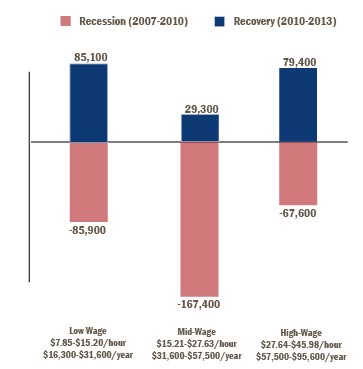 A worker who earned $32,000 to $58,000 a year when the recession hit in 2007 was much more likely to lose a job than workers at the high and low ends of the spectrum. That’s because mid-wage industries lost the most jobs during the recession, as GBPI documented in a recent report. During Georgia’s slow recovery, those mid-wage jobs aren’t making a comeback. In fact, low-wage and high-wage job growth is outpacing the ones in the middle by a great deal. For the middle-class worker, that’s not good news. For the low-income worker who wants to climb the economic ladder, that trend is downright scary. State policy makers should keep this new reality at the top of their minds as Georgia continues its sluggish climb toward economic recovery.
A worker who earned $32,000 to $58,000 a year when the recession hit in 2007 was much more likely to lose a job than workers at the high and low ends of the spectrum. That’s because mid-wage industries lost the most jobs during the recession, as GBPI documented in a recent report. During Georgia’s slow recovery, those mid-wage jobs aren’t making a comeback. In fact, low-wage and high-wage job growth is outpacing the ones in the middle by a great deal. For the middle-class worker, that’s not good news. For the low-income worker who wants to climb the economic ladder, that trend is downright scary. State policy makers should keep this new reality at the top of their minds as Georgia continues its sluggish climb toward economic recovery.
Last week GBPI joined the Center for Working Families to host a policy briefing in the wake of the recent White House Summit on Working Families. The briefing brought employers and other stakeholders together to explore challenges Georgia’s Low-Income Working Families face. The group also discussed employer practices that make a difference for working families. The GBPI team summarized recent reports, “At the Bottom of a Broken Ladder” and “Bad Time for Good Jobs.”

It is critical for us to continue the dialogue and seek policy solutions to improve conditions for Georgia workers. Their success is the lifeblood of Georgia’s overall economy.
While examining job trends since the recession, GBPI analyst Wesley Tharpe found that Georgia’s recovery is leaving behind jobs for the middle class, as illustrated in the bar chart. The state’s mid-wage industries lost more than 167,000 jobs from 2007 to 2010 and only gained back a little more than 29,000 jobs from 2010 to 2013. Low-wage jobs came back at a much higher rate.
Four in 10 families in Georgia are low-income, earning less than $33,000 a year, and these job growth trends don’t hold much promise. Jobs in these low-wage industries are typically for food servers or temp workers. They often come without decent benefits packages, lack upward mobility and don’t require advanced skills. These workers will need a variety of policy solutions to improve their economic status, observed Melissa Johnson, another GBPI analyst. Policy solutions she recommends include increasing access to training through HOPE grants, access to health care through Medicaid expansion and support for child care to free up time for these families to work.
Representatives from the Gap and IKEA shared information about their corporate philosophies. Both retailers increased corporate minimum wages for their workers and provided better comprehensive benefits because it’s good for business, they said.
Georgia needs to pursue policies that will increase jobs and create better working conditions. We can do the right thing by Georgia working families by making sure they benefit from Georgia’s growing economy.




